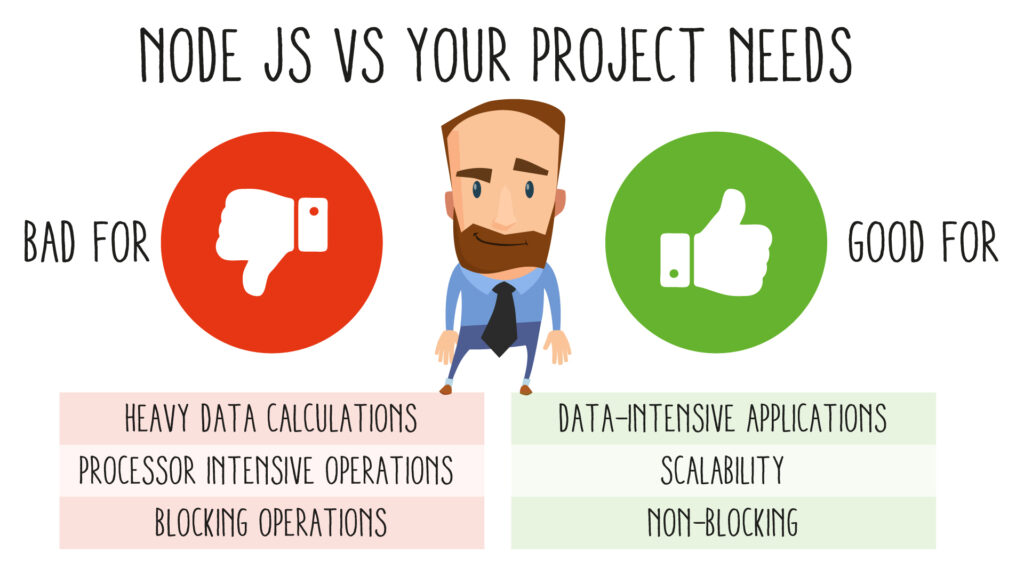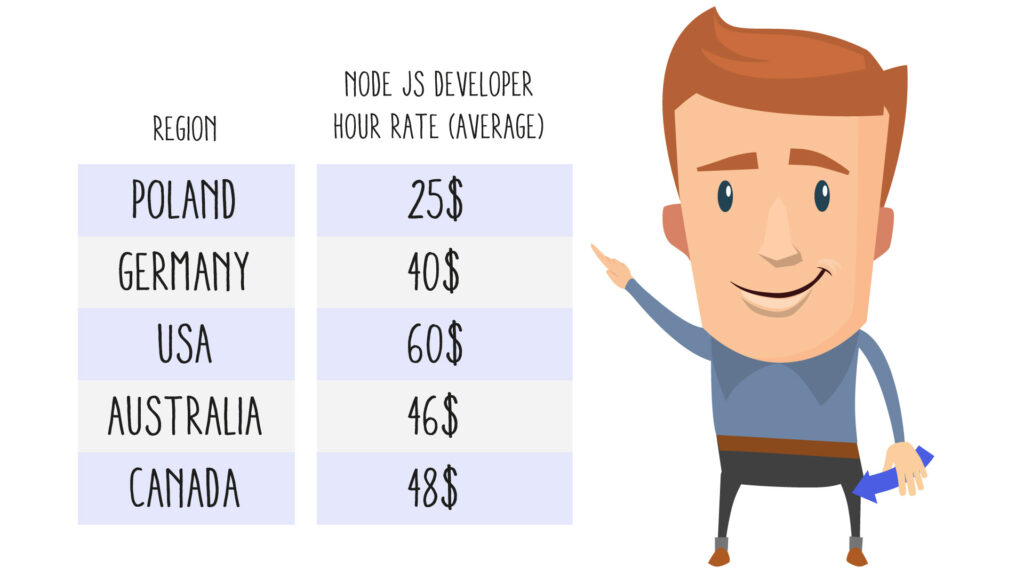Choosing the right tech stack is one thing. Hiring high-quality talent for successful project implementations is another. Node js emerges as one of the most sought-after technology in the software development industry. However, the developer talent pool is continuously dwindling. Research shows that over 40 million software development jobs go unfulfilled due to a lack of high-quality developer talent. No wonder successful startups opt to outsource node js development.
If you’re thinking about doing the same, you’re not alone.
Building applications, especially enterprise or large-scale projects, are no mean fit. It typically involves several phases:
- Planning
- Design
- Development
- Integration
- Quality assurance and testing
- Maintenance
- Release
Each of these phases requires a certain degree of expertise and commitment, depending on your project needs and resources.
Seems overwhelming, right?
Outsourcing your node js development needs ensures that you have the best talents working on your project and lets you focus on your core business operations.
In this article, we’ll discuss everything you need to know on how you can outsource or acquire node js development services.
So, without further ado, let’s dive in.

Is Node JS a Good Choice?
Because javascript is originally a client-side programming language, many are quick to dismiss its server-side capabilities. However, javascript serves as a great backend solution for many enterprise applications. And, node js is the driving force behind this paradigm shift.
Whether you plan to outsource node js development or not, choosing the right backend tech is one of the first and critical stages of any startup’s life cycle or software development project. The right choice must satisfy your project goals and needs. In other words, you must select a solution or solution set that provides all the features and functionalities that’ll ensure your project’s success. Therefore, the real question you should ask is, “what are my project’s goals and needs?”
Node js is not a framework or a library. Rather, it’s a runtime environment for building fast, scalable network applications. It is based on chrome’s V8 javascript engine. It utilizes javascript’s event-driven architecture and asynchronous I/O (input/output) model to produce lightweight and efficient server systems.
However, node js gets a lot of stick regarding its server-side capabilities. But, in reality, it boasts a rich ecosystem of tools and features that facilitate easy web, mobile, or backend development.
Yes, node js is awesome, but is it the right choice for your project? Keep reading to find out.

What Project Type is Node JS Best Suitable For?
Node js has a set of characteristics that make it stand out among other sever-side application platforms. (As we’ll see later on when we compare node js to other platforms). These characteristics are specifically related to how threading and concurrency work with node js.
Although there’s the “worker threads” concept, node js is, in fact, single-threaded, as it has only one “application” thread available. In other words, all the execution that happens in a node.js environment is carried out by one processing thread. So, what this thread does is; that it runs through a queue of events using an event loop. Let’s assume you have a bunch of events that need to execute. Node js “queues” these events, and the single processing thread executes them one after the other. In a nutshell, no two events execute in parallel in node js.
This single-thread event-driven approach gives node js the ability to scale and process multiple requests at once. However, it becomes a problem if you have a code that’s processor intensive and takes a lot of time to execute. Node js features and functionalities get lost in heavy computation.
So, where then does node js shine?
Imagine this scenario: you make a network call from a browser to a server elsewhere. Assuming it takes five seconds to get a response, does node js’ single thread idly wait for this response before executing another event?
No, it doesn’t. Even if it wanted to, it can’t afford to, as there’s only one processing thread.
Thankfully, javascript is asynchronous, and so is the browser and the node js platform. In a node js environment, the API responsible for long-running tasks, such as sending HTTP requests, is asynchronous. In other words, when it sends a request, it doesn’t wait for a response. It says, “I’ve sent this request. I’ll deal with the response when I get it. On to the next one”. This way, you can process hundreds of requests at once, and when the response returns it gets queued up and executed accordingly.
This makes node js a perfect solution for applications that are:
- Non-blocking
- Event-driven
- Data-intensive
- I/O intensive
If your project falls in this category, node js is a great fit for you, and you can outsource node js development for the best results.

Node js vs. Other Server-side Application Platforms
Unlike node js, other server-side application platforms are multi-threaded. In other words, they have a thread pool, with each thread doing its own thing. So, let’s say you ask one of those threads to make an API call. It’s going to make that call. But if something else comes up, another thread handles it, as long as idle threads are available.
However, when an instruction depends on an external IO, like in a data-intensive application, the said thread must wait. It has to receive the response and that instruction has to return the response to the next instruction. So, if you have a pool of ten threads, for example, and you have ten events waiting for a response. Well, you have a problem because there are no idle threads to execute new tasks. These tasks will be queued and slowly allocated to threads when they become available. Thereby hurting application performance.
But in node js, multiple events can interact with an external database without hurting performance. This is because the single thread will keep executing new instructions. It’s not going to sit there and consume resources.
That said, what if you’re working on events that do not depend on any external database and are compute-intensive? This is where multi-threaded platforms thrive.
Since node js is single-threaded, it cannot pass other instructions to new threads, even if you outsource node js development. Therefore, heavy computation blocks the system.
In other words, node js isn’t ideal for:
- Heavy data calculations
- Processor intensive operations
- Blocking operations
In a nutshell, if your “project needs” include; fast, scalable, non-blocking, data-intensive applications, node js is perfect for you.
Still not convinced about node js? Here are companies using node js.

What products/companies use node js?
Since its introduction in 2009, by Ryan Dahl, at the jsConf, node js has been adopted by many companies as the main backend solution.
LinkedIn was one of the first companies to employ node js as its mobile application backend. Later on, major enterprises followed suit. Some of these include
- Uber
- eBay
- Walmart
- Netflix
- Microsoft
- IBM

If you read up to this point, chances are you believe node js is a perfect fit for your project. And, you’re probably thinking about building a node js development team. However, as mentioned earlier, the developer talent pool is continuously dwindling. Therefore, finding the right talents is becoming increasingly difficult.
What if you had access to a special developer talent pool, and you need not concern yourself with the tedious development process?
Here are reasons you should outsource node js development.
Why Should You Outsource Node js Development?

Ensure you have experts working on your project.
As technology advances, the demand for software engineers increases. According to the US labor bureau, there’s an average of 189 200 software engineer job openings yearly. There’s also a good chance that more than 40% of those job openings require node js development services. While this would sound interesting to software engineers, not so much so to companies looking to fill these openings. This is because there aren’t enough developers; hence, startups find it incredibly difficult to hire the right talent.
What if you never have to worry about finding the right developer talent for your project?
When you outsource to a node js development company, you tap into a ready-made pool of tried and tested node js professionals. These professionals can offer high-quality services, experience, and expertise. Moreover, high-level node js development services providers usually have an impressive talent base.
Focus on your core business operations.
Here are perfect examples of brands that recorded success by outsourcing development and focusing on their core business operations.
A few years ago, Slack was amid several business growth campaigns but also needed to improve its user experience (UX). They opted to outsource their UX development needs to focus on other growth areas. This move meant they could improve UX while concentrating on other business objectives. They recorded great success, with Slack’s UX becoming its unique selling point.
Another example is Fab, founded by Jason Goldberg, a great salesman. Rather than trying to build an IT development team, he opted to outsource Fab’s software development needs. This way, he could focus on what he was good at, “sales.” This move saw them record great success as they quickly skyrocketed into a billion-dollar startup.
While these examples may not have involved node js development, they’re all outsourcing software development projects. With businesses under increasing pressure to innovate or risk falling by the wayside, you can’t afford to lag. Trying to add an in-house solution would cost time and effort best spent on your core business operations.
What is your core business operation? For example, if it’s selling real estate, you don’t have to build the chat system for your clients.
Think of it this way, is your goal to build a node js development team or a successful startup?
Avoid hiring mistakes
If you’re a CEO or you’ve worked as a recruiter, you probably know the amount of work that goes into hiring the right talent. Hiring node js development talent is a delicate skill that requires the combination of intuition, process management, social networking, and technical know-how.
Particularly challenging is the fact that evaluating the hallmark capabilities of node js talent is no mean fit. How do you determine a candidate’s creativity or innovative prowess? How can you tell if they are team players? How can you measure their ability to respond to constructive criticism?
While assessing these “not so obvious” skills is no easy task, it is essential to hire the best talent. And even the best recruiters find it difficult to do this.
Even if you don’t seek out and interview candidates yourself, you still have to onboard them. This may require an onboarding team or personnel to handle the paperwork alongside other onboarding necessities. It doesn’t end there. According to statistics, hiring a developer takes an average of 30 days.
Imagine going through these same processes every time you have a project you don’t have in-house skills for. You can weigh it up yourself. Would you opt for in-house hiring that could cost you up to 10X the abovementioned processes? Or outsource node js development to a company that has worked hard to set in place the best node js talents.
Reduce development cost
Different factors can affect your node js development costs, some of which include:
- Project type
- Tech stack
- Geographic location
- Hiring model
However, from our experience, the hiring model takes the largest bite off node js development costs. According to Devskiller, hiring a developer costs upwards of $50,000. This includes recruitment costs, onboarding costs, and productivity loss in the time it took to complete the hiring process. Multiply that number by the number of developers you’ll need to hire, depending on the project type and size. Write your answer down on a piece of paper.
Given that outsourcing costs but a fraction of the estimated figure above, we’re seeing many companies adopt this approach. But don’t take our word for it. According to Deloitte, 70% of companies choose to outsource software development for cost reduction.
Now, let’s also estimate how much it would cost to outsource your node js development.
How much does it cost to outsource node js development?
Like in-house hiring, the costs of outsourcing depend on a number of factors. These can include
- Project complexity
- Tech stack
- Number of people-hour involved
- Geographic location
However, in this case, the most important factor is the people hour involved. Most node js outsourcing companies charge per developer hour. But it’s not so simple to estimate because developer’s hour rate varies depending on location. The table below compares the average node js hourly developer salary in Poland, Germany, the USA, Australia, and Canada.

It is important to note that the regional differences in node js cost per hour make outsourcing even more lucrative for startups. There’s no need to explain why the average node js developer’s hourly salary in Canada differs from that of Poland, for example. There are so many economic factors in play here, in fact, more than we would like to get into.
That said, the idea is not to sacrifice quality to reduce costs. According to Hackerrank, Poland with the lowest hourly rate on the table above has the third most talented developers. So, by outsourcing, you can get the best quality while also reducing costs.
So, let’s assume you’re outsourcing to a node js development company at an hourly rate of $40/hour. Your project requires, say, six developers to work for six weeks ($40 per week). If you do the maths correctly, you’ll arrive at $57,600.
Remember the figure you wrote down earlier? Compare that with this estimate, and you’ll have your answer. Outsourcing your node js development helps you reduce development costs.
Improve final product quality
Great node js development companies can have dedicated resources for development, testing, and maintenance. In contrast, in-house node js development projects are limited to your available resources. Having dedicated resources for your projects can often improve the quality of the final product, and outsourcing offers this luxury.
Furthermore, by outsourcing, you don’t need to worry about making costly hardware and software investments. The outsourcing company must fill all of these needs and specifications. You don’t assume responsibility for the tools or software they require to do your job on schedule.
Additionally, depending on the company, outsourcing node js development can mean working with developers from all over the world. Since in-house beliefs and technology don’t limit your outsourced team, they’re more likely to intuit ideas that can improve product quality. But it doesn’t end there; outsourcing can help you reduce technical debt. This is particularly true for companies migrating from off-the-shelf solutions to custom solutions.
In addition to the cost savings described in the previous point, this results in even more savings. Since the outsourced development team will handle everything, you can eliminate the cost of hiring and retaining in-house developers. Moreover, you’re more likely to get improved outcomes from an external workforce than you’d normally have access to in-house.










